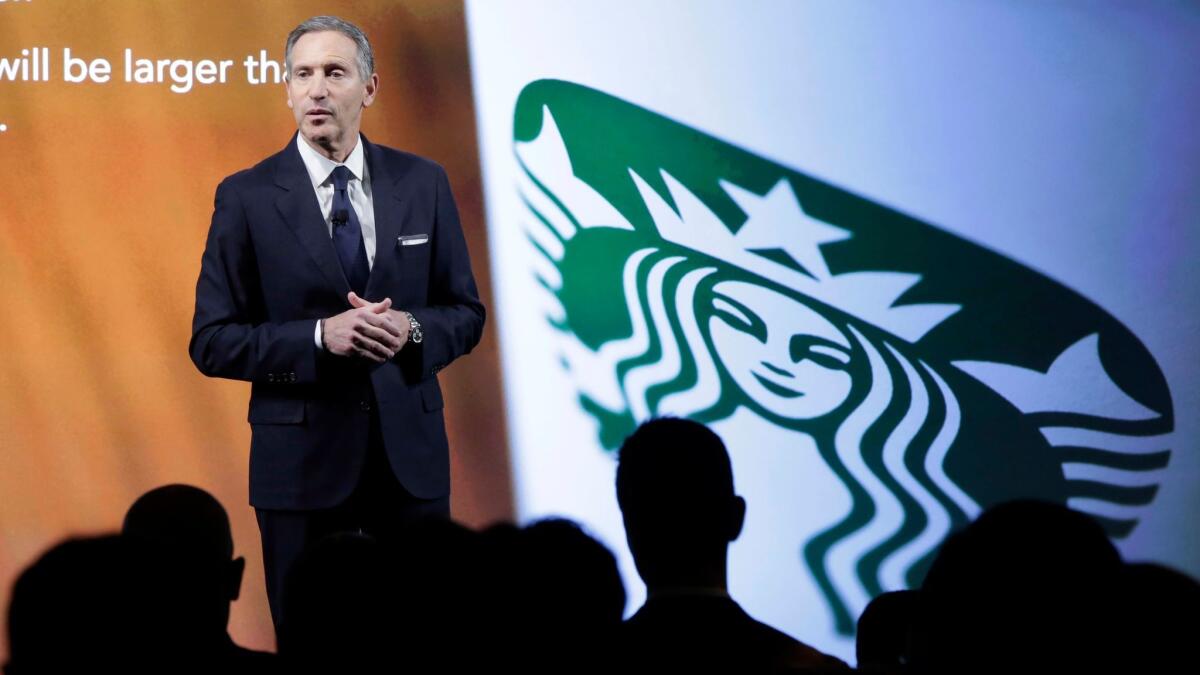Op-Ed: Even coffee shops are political now

In the coffee shop where I am typing, the Band is playing over the speakers (first “Atlantic City,” then “The Weight”). On the wall across from me, there is a framed piece of muslin sackcloth printed with the words “Café de El Salvador.” Baristas hand out wooden chips for customers to deposit in one of four jars, casting votes for which charity they’d have the shop donate money to this month; choices include a food bank and a center for mentally ill adults. Near the ceiling, there is a strip of black paint on which is chalked this quotation: “There is nothing wrong with America that cannot be cured by what is right with America.” — William J. Clinton.
This coffee shop is called Blue State Coffee.
Independent coffee shops everywhere tend to have a liberal vibe, but Blue State, which began in 2004 with the location where I sit in New Haven, Conn., and has expanded to eight branches in Connecticut, Massachusetts and Rhode Island, makes its politics explicit. Conservatives can drink here, of course, but while their money is welcome, their politics are not.
Blue State Coffee is a prime example of the politicization of commerce. Where once upon a time profit-minded entrepreneurs were terrified of being identified with one political camp or another, thus alienating potential customers from rival camps, today, they’re embracing partisanship as a strategy. What they lose in mass appeal, they seem to think, they gain in fierce loyalty.
We saw this gamble two weeks ago, when, in response to President Trump’s travel bans applying to seven Muslim-majority countries, Starbucks pledged to hire 10,000 refugees over the next 10 years. There was nothing subtle about CEO Howard Schultz’s move; in his letter announcing the plan, Schultz praised trade with Mexico and seemed to express support for the Affordable Care Act. In effect, Schultz was saying that Starbucks had joined the resistance.
The same week, Uber canceled surge pricing on rides to JFK Airport in New York City, a move that seemed to undercut a strike called by taxi drivers to protest the detention of foreigners denied entry to the U.S. Sensing an opportunity to stake out turf to Uber’s left, rival car-share company Lyft announced a $1 million contribution to the American Civil Liberties Union. But Uber wouldn’t let that stand. Faced with numerous deletions of its app, and a vente-sized cup of bad publicity, the company announced a $3-million legal fund for immigrant drivers. It also asked Trump to cancel his temporary travel ban.
It sometimes seems as if every company in the strip mall has a political brand.
Commerce has, of course, always been political. Businesspeople, more often than not conservatives, have networked and lobbied to fight government regulation, unions and other perceived evils. But the politics used to be conducted on the down-low. The National Prayer Breakfast, for example, began in 1953 as the bipartisan, public face of Methodist minister Abraham Vereide’s right-wing activism. (He got his start organizing businessmen’s opposition to the New Deal.) The U.S. Chamber of Commerce was organized by President Taft to fight the labor movement, but then went through a long period of bipartisanship before returning in recent years, under CEO Tom Donohue, to an open allegiance with Republican business interests.
All of this was largely invisible to most consumers. Now it sometimes seems as if every company in the strip mall has a political brand. I instinctively recoil every time I drive by the Hobby Lobby near me — I can’t disassociate it from its evangelical owners’ successful Supreme Court fight, in 2014, to deny employees coverage for contraception in their healthcare plans. The new Chick-fil-A off Exit 9? Right wing, by virtue of its owners’ anti-gay political donations.
If I am going to be stuck in traffic, I’d always rather be stuck behind a Subaru, because at least I can assume I’m near likeminded folk — Subaru being an early, aggressive seeker of lesbian customers. Later that night, I’ll console myself with a movie from gay-friendly Disney and a pint of ice cream from the reliably liberal Ben and Jerry’s. (Sometimes too reliable — they got suckered by the scientifically suspect anti-GMO panic). Then I’ll brush the sugar off with environmentally friendly Tom’s of Maine toothpaste. Which also will scrub off the stains from my Blue State coffee. And so the circle of virtue is complete.
Self-satisfied as my shopping choices make me, I am not sure they are good for the country, even if they are better for the planet. “Third places” like coffee shops — to use sociologist Ray Oldenburg’s term for places that are neither home nor work — are crucial for organizing social movements. But they also should function as sites of unexpected conversation, the kind that might change our lives — as when we meet our soulmate over an extra-hot non-fat mocha — or, perhaps, our political views.
As a progressive, I am cheered by what the Starbucks and Lyft cases tell us about the country: that people who agree with me have buying power, and thus clout. You have to believe that CEOs at Starbucks, Disney and elsewhere have run the numbers and concluded that our country resembles the popular vote, not the electoral college. There are more of us than there are of them. And thus our capitalist system will be one check on Trump’s retrograde policies.
But if conservatives avoid Starbucks, then something is lost — for me, anyway. And maybe I’m losing something by never patronizing Hobby Lobby. I’m not sure what they sell, but there are no doubt some mighty fine people buying it.
To read the article in Spanish, click here
Mark Oppenheimer, a contributing writer to Opinion, is the host of the podcast Unorthodox.
Follow the Opinion section on Twitter @latimesopinion and Facebook
More to Read
A cure for the common opinion
Get thought-provoking perspectives with our weekly newsletter.
You may occasionally receive promotional content from the Los Angeles Times.






